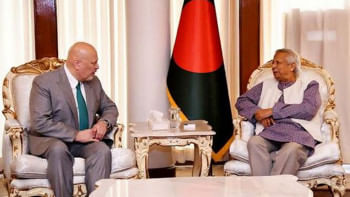Machinery imports more than double

Capital machinery imports more than doubled in the first quarter of fiscal 2016-17 from a year earlier on the back of the remediation works being carried out by garment factories.
Between July and September, letters of credit for import of capital machinery worth over $1.8 billion, up for $820 million a year earlier, according to data from the Bangladesh Bank.
The government infrastructure projects and expansion of steel mills and the food processing sectors also contributed to the spike in capital machinery imports.
“Garment factories, which are obligated to become compliant, are importing most of the capital machinery,” said Syed Mahbubur Rahman, managing director of Dhaka Bank.
More than 4,000 woven and knitwear garment factories are under pressure from their Western buyers to improve their workplace safety to international standards by June 2018. Otherwise, the buyers will cease to buy from the factories.
“Garment entrepreneurs are importing a lot of capital machinery either to upgrade or expand their existing factories,” said Shafiqul Alam, managing director of Jamuna Bank.
Abdul Halim Chowdhury, managing director of Pubali Bank, echoed the same.
David Hasanat, managing director of Viyellatex Group, a major garment exporter from Bangladesh, bought safety machinery worth Tk 3.5 crore for a single factory in Gazipur.
Each and every garment factory has to invest to improve factory safety conditions as per the suggestions of Accord and Alliance, the two Western inspection agencies, Hasanat added.
Also, there is an allegation that businesses launder money in the name of importing capital machinery as there is duty benefit.
Businessmen have to pay only 1 percent duty for import of capital machinery, so a section of them show inflated prices, it has been alleged.
“If a businessman wants to import by overpricing capital machinery, we cannot stop it as there are many grades and qualities of products,” said a managing director of a bank wishing not to be named.
He said import appears to be an easy route for money laundering; otherwise it is not possible for a Bangladeshi businessman to buy property worth $150 million in Singapore.
As per law, capital cannot flow out of Bangladesh without prior approval from the central bank.


 For all latest news, follow The Daily Star's Google News channel.
For all latest news, follow The Daily Star's Google News channel. 



Comments